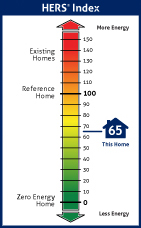Types of Energy Audits
The best way to understand a home’s energy problems is by doing an energy audit. Energy audits are also called energy assessments and what they do is:
- Pinpoint where and how a home is losing energy.
- Which systems in the home are working inefficiently.
- What cost-effective measures can be put in place to rectify the problems.
On average, energy audits can cost anywhere from $300 to $800, depending on the type of audit.
Homeowners can get an energy audit through a Home Energy Auditor or a RESNET Home Energy Survey Professional, and can choose from two types of energy audits:
-
Home Energy Survey
A home energy survey is a visual inspection that doesn’t include the use of diagnostic testing equipment. Its purpose is to assess the general energy performance of an existing home including:
- Building envelope features (windows, doors, insulation, ducts) and ages.
- Heating, cooling and ventilation equipment types, characteristics and ages.
- Appliance and lighting characteristics.
- Comfort complaints.
- Visible moisture issues.
- Visible health and safety issues.
A RESNET Home Energy Survey Professional (HESP) will request a review of utility use and billing history to better understand potential opportunities for savings. A report of the complete assessment is provided, including basic recommendations for improving the home’s energy efficiency, as well as low-cost, do-it-yourself tasks. Also included is information on relevant utility-based programs to encourage the homeowner to take action. A home energy survey takes approximately one hour to complete.
-
General Energy Audit
A general energy audit is also known as an energy assessment, standard energy audit or detailed energy audit. It expands on the home energy survey by collecting more detailed information regarding the home’s energy usage, as well as a more thorough financial analysis of its energy costs.
The general energy audit also includes diagnostic testing using specialized equipment such as a blower door test, duct leakage tester, combustion analyzer and infrared camera. These tests are done to determine:
- The location and number of air leaks in the building envelope.
- How much leakage is occurring from HVAC distribution ducts.
- How effective is the insulation inside walls and ceilings.
- Any existing or potential combustion safety issues.
A home energy auditor such as a certified RESNET Home Energy Rating System (HERS) Rater will conduct a whole-house evaluation including a computer software analysis to identify and prioritize proposed treatments for improvement. This is followed by a detailed report providing suitable retrofit recommendations and specifications. The Home Energy Auditor can recommend suitable RESNET Qualified EnergySmart Contractors to the homeowner that can perform the work. A general energy audit takes 3-4 hours depending on the size of your home.
Difference Between an Energy Rating and Energy Audits

Essentially, the difference between an energy rating and energy audits is that an energy rating measures a home’s energy performance as compared to other similar homes, while energy audits (like the two types of energy audits described above) show homeowners where and how their homes are losing energy.
An energy rating will result in the home receiving a HERS Index (Home Energy Rating System) Score, which has been likened to a MPG (miles-per-gallon) sticker for homes. It gives homeowners, and prospective buyers, a good idea of what that home costs to run and how energy efficient it is.
Energy audits identify a home’s energy problems and provide the homeowner with cost-effective solutions to those problems.
How to Get an Energy Audit
RESNET Home Energy Professionals offer both types of energy audits (home energy surveys and building performance assessments). Find a RESNET Home Energy Auditor or RESNET HESP in your area.



